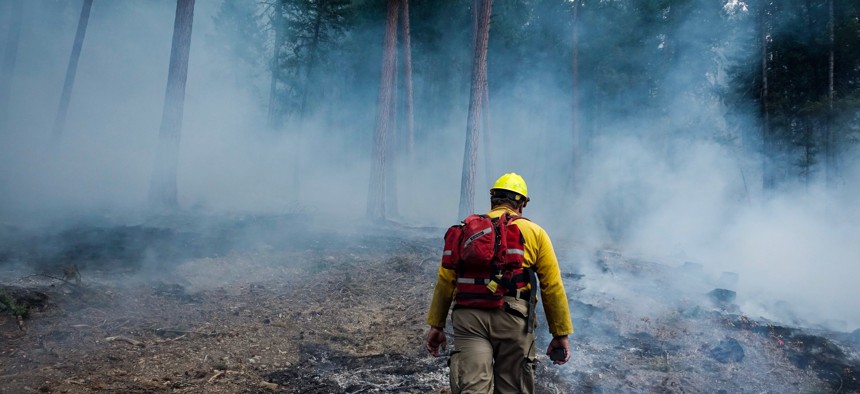
The National Federation of Federal Employees said that without permanent pay raises, 30 to 50% of the federal firefighter corps could leaver for higher paying jobs. Robert LeBlanc / Getty Images
Lawmakers, employee groups call for a permanent increase in federal firefighter pay
Under current measures implemented by the Biden administration, federal wildland firefighters will face yet another “pay cliff” this fall.
Senate lawmakers and federal employee groups this week urged Congress to take action on bipartisan legislation aimed at ending longstanding pay disparities between federal wildland firefighters and their state and local counterparts, amid a temporary reprieve to a feared “pay cliff” threatening the federal government’s firefighter corps.
For years, federal wildland firefighters have warned that their pay pales in comparison to the salaries enjoyed by firefighters employed by state and local governments, fueling staffing shortages as the nation’s wildfire season grows longer due to climate change.
In 2021, President Biden sought to tackle this issue first by issuing a series of cash bonuses to federal firefighters to ensure that they make his then newly implemented $15 minimum wage for federal workers and contractors. And the bipartisan infrastructure law authorized temporary pay increases of up to $20,000 or 50% of a firefighter’s base salary, whichever is lower.
But the money set aside for those raises ran out last fall, meaning lawmakers had needed to include an extension of the pay raise with each short-term continuing resolution since then. Congress included funds to extend the temporary raise in legislation providing full-year appropriations to a portion of the government last week, putting off the next “pay cliff” until September.
Biden’s fiscal 2025 budget proposal, released this week, would make more than $500 million in new spending—compared to fiscal 2023 appropriations—on the federal firefighter workforce, including continued and “permanent” pay raises, improved health services and housing, in addition to expanded hiring.
But federal employee groups and some lawmakers said that Congress shouldn’t wait until the next annual appropriations cycle to tackle firefighter pay disparities. The National Federation of Federal Employees, a union that represents around 10,000 federal wildland firefighters, said lawmakers should prioritize passing the bipartisan Wildland Firefighter Paycheck Protection Act (S. 2272) now, rather than waiting til the next deadline. NFFE has previously said the union anticipates 30 to 50% of the federal firefighter corps to leave federal service in the event that the temporary pay raises expire.
“Now that Congress has safeguarded wildland firefighter pay until October, it is time to make those compensation levels permanent,” said NFFE National President Randy Erwin. “NFFE members and firefighters across the country are fed up with seeing the can kicked down the road repeatedly. They are frustrated with the uncertainty that their pay could be cut in half, and they won’t be able to provide for their families. This uncertainty is taking its toll on the wildland fire workforce in terms of low recruiting and retention numbers. We need a permanent fix for the pay cliff now.”
At a hearing of the Senate Homeland Security and Governmental Affairs Committee on Thursday, lawmakers and federal and state fire officials stressed the importance of ensuring the federal firefighting workforce is paid commensurately with their duties and eliminating pay disparities across all levels of government. Jamie Barnes, director forestry, fire and state lands for Utah’s Department of Natural Resources, said her state recently passed legislation bringing her state’s wildfire workforce more in line with federal firefighter wages.
“Now we feel that Utah is in a good place compared with our federal partners, but there is still that compensation bracket with regard to benefits—some of our time-limited firefighters, who fight fires just throughout the fire season, don’t receive a benefits package, and it’s an important piece of the puzzle,” she said. “[When] a fire happens, it knows no boundary and we’re all out out on the landscape, working together to put that fire out. So whether you’re a state wildland firefighter or a federal wildland firefighter, we should all be making an amount that is similar.”
Sen. Laphonza Butler, D-Calif., asked Lori Moore-Merrell, the Federal Emergency Management Agency’s fire administrator, about the impact of a feared mass exodus of federal firefighters in the event that the temporary pay raise lapses on the nation’s ability to suppress wildfires.
“The impact if we lost that many? It would be huge,” Moore-Merrell said. “It would default to city and state governments, and they are already covering for us already because there is a shortage [of federal firefighters]. If we don’t pay the federal wildland firefighters and pay them year-round to take on what is their responsibility on federal lands to be the first, the burden will be falling on local firefighters to get there, and then when [the federal corps] can deploy, it’s later. [We need] sustainability of pay: not just a bonus or a one-time payment that’s not pensionable. They need pay increases. Right now they can go apply at Target or somewhere and make almost double what they’re making an hour here.”







